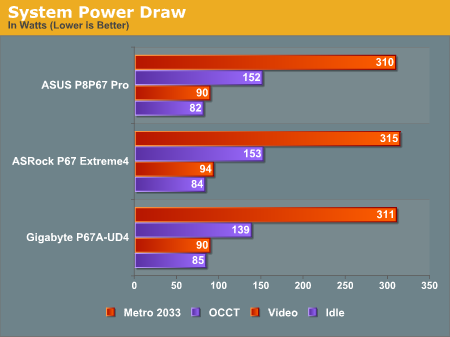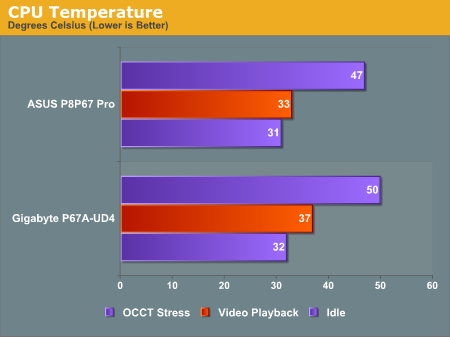The Battle of the P67 Boards - ASUS vs. Gigabyte at $190
by Ian Cutress on January 20, 2011 4:15 PM EST- Posted in
- Motherboards
- Gigabyte
- Asus
- P67
| Test Setup | |
| Processor |
Intel i5-2500K ES – 3.3 GHz (3.7 GHz Turbo) 4 Cores, 4 Threads, 6MB L3 |
| Motherboards |
ASUS P8P67 Pro Gigabyte P67A-UD4 |
| Cooling | Corsair H50-1 Water Cooler |
| Power Supply | Enermax Modu87+ 600W 80PLUS |
| Memory |
Patriot Viper Xtreme DDR3-2000 9-10-9-27 2x4GB Kit, 1.65V Patriot Viper Xtreme DDR3-2133 9-11-9-27 2x2GB Kit, 1.65V Corsair Vengeance DDR3-1600 9-9-9-24 2x4GB Kit, 1.50V |
| Memory Settings | Patriot Viper Xtreme DDR3-1333 9-9-9-24 2x2GB |
| Video Cards | XFX HD 5850 1GB |
| Video Drivers | Catalyst 10.12 |
| Hard Drive | Intel X25-M 80GB SSD Gen2 |
| Optical Drives | LG GH22NS50 |
| Case | Open Test Bed – CoolerMaster Lab V1.0 |
| Operating System | Windows 7 64-bit |
| USB 2/3 Testing | Patriot 64GB SuperSonic USB 3.0 |
Power Consumption and CPU Temperature
Power consumption was tested on the default system as a whole with a wall meter connected to the power supply, using a dual GPU configuration. This method allows us to compare the power management of the UEFI/BIOS and the board to supply components with power under load, and includes typical PSU losses due to efficiency. These are the real world values that consumers may expect from a typical system (minus the monitor) using these motherboards.


Neither system does too badly in power consumption readings, but the Gigabyte is behind on temperature deltas. This could easily be attributed to the mounting - while every attempt is made to repeat the mounting technique, there is always a range of statistical variation, so the 2-4ºC difference is nothing obvious to be concerned about.










137 Comments
View All Comments
kmmatney - Monday, January 24, 2011 - link
Agreed. The last 3 motherboards I bought all came free (or close to it) in a Microcenter deal. 2 AMD system, and one Intel (socket 775). They all have decent overclocking, and have been plenty stable. Your better off spending the money you save on more RAM, or an SSD.MobiusStrip - Sunday, January 23, 2011 - link
"I'ma get that"You left out the wrong word. The "a" is the beginning of "a-gonna"; the phrase is "I'm a-gonna" do something. If you're going to remove something, it's the "a": I'm gonna get that.
softdrinkviking - Monday, January 24, 2011 - link
For all you know, "I'ma get that" could be widely used in this person's area, how would you know?Don't correct slang, it completely defeats the purpose, and it's kind of insane.
Sufo - Tuesday, January 25, 2011 - link
The "a" is the last a of gonna. The part that is omitted is the "gonn". If you're going to be such a useless pedant, at least get your facts straight.Not the best source, but http://en.wiktionary.org/wiki/Imma
"nope"
maxnix - Thursday, April 28, 2011 - link
Unfortunately for you, spell checking isn't one of them!Spazweasel - Thursday, January 20, 2011 - link
EVGA seems late to the game. They've announced their first 1155 board (130-SB-E675-KR) on their website, but has anyone actually seen it in the wild (much less reviewed)?seamusmc - Friday, January 21, 2011 - link
Spaz, (chuckle)I thought I read somewhere in their forums that EVGA's first P67 board will be available in February.
Spazweasel - Monday, January 31, 2011 - link
http://www.anandtech.com/show/4142/intel-discovers...Okay, now we know why!
It will be interesting to see if EVGA was among the first to be saying "Hey, something's not right here" and this was the reason.
DanNeely - Thursday, January 20, 2011 - link
The obvious feature gigabytes $260/320 board shas is PCIe bridge chips that allow a huge number of USB3 ports and more x16 slots, although you're only getting higher burst performance per device since they're all still sharing the same 16 lanes from the CPU.The other traditional feature is better mofsets/mofset coolers to allow higher voltages for overclocks if you have the cooling to handle the heat.
Pjmcnally - Thursday, January 20, 2011 - link
This is a great review that I was very happy to read. I picked up the ASRock board at release but I wasn’t sure I had made a good decision.I believe there is one small error in the review, the headers for both lists of board features read “ASRock P67 Extreme4” not “Asus P8P676 Pro” or “Gigabyte P67A-UD4”.